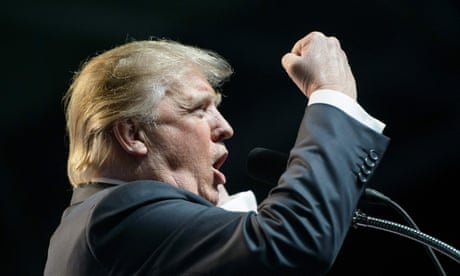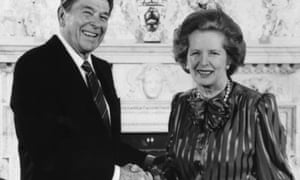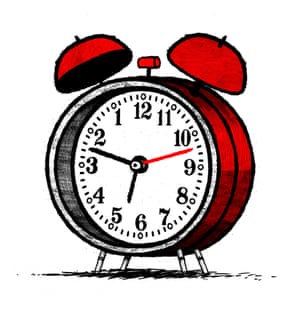Will Hutton in The Guardian
For 70 years, the US and Britain have underwritten the open global trading system, partly because of a stubborn and correct belief in the merits of free trade,
partly out of self-interest as beneficiaries of globalisation and partly because, strategically, it spreads democracy, peace and capitalism.
They have spearheaded successive rounds of tariff cuts and multilateral trade deals and stood by, first, the General Agreement on Tariffs and Trade (Gatt) and its successor, the World Trade Organisation, to keep the system honest. They have cut regional trade bargains, promoted the European single market and, above all, kept their markets open despite other countries, notably China, gaming the system for their own narrow advantage.
The consensus in both countries was that the wider gains transcended any localised pain. No longer. The Americans voting for the anti-trade, America first Trump have consigned all that to history and the unintended consequence of
Brexit will mean the same for Britain. The system that underpinned our collective prosperity is about to be trashed.
It brought national and international benefits, including an avalanche of inward direct investment into both countries, powerful international financial and business service sectors, rising global living standards and the economic and democratic transformation of Asia. But both countries’ manufacturing sectors have taken disproportionately heavy hits. Drive round the ailing industrial towns of south Yorkshire or Ohio and compare the economic and social landscape with that of Düsseldorf, Munich, Shanghai or Shenzhen. Decade of consistent manufacturing trade deficits have exacted a cruel toll.
This year, working-class voters across America and Britain’s rotting industrial heartlands delivered their verdict.
No more plants moving abroad. No more closures because of cheap imports. No more sales of great companies to foreigners. No more stagnating blue-collar wages. No more immigration. It may be that there are jobs and great prospects aplenty in the burgeoning tech and service sectors in the big cities driven by global trade, but they don’t care. They are hurting and nobody has taken decisive action to help them. The votes for Trump and Brexit mark the end of an era and a new dark age of closure, protectionism and nationalism.
Leading Tory Brexiters will insist that this is a travesty of their position; they want Britain to access more global trade and not be imprisoned, they crazily claim, by the confines of the slow-growing European Union and its bureaucratic inability to cut aggressive trade deals with the rest of the world. They live in a dreamland if they feel that the rest of the world is more committed to free trade than Europe, while
EU membership did not hold back Germany from being among the world’s major exporters.In any case, apart from the promised closure of borders to immigrants, that is not what their voters want, as Nigel Farage always better understood than any of his Tory allies he cordially despises. Working-class voters in south Yorkshire and the West Midlands want the same as their counterparts in Pennsylvania, Michigan and Wisconsin. After all,
it was those three states, with their tiny 100,000 vote margin, which gave Trump the electoral college votes for victory. He might be a billionaire, but he is, or at least styles himself, a “blue-collar billionaire”.
Blue-collar (post-)industrial workers don’t benefit from free trade and immigration, as he has consistently said for 18 months, in the teeth of opposition from the Republican mainstream who remain free traders. His movement, as he called it, wants to stop both.
‘Build that wall” – along the US-Mexican border – was one of the most insistent chants at his rallies,
along with the forced deportation of 11 million illegal immigrants. But more importantly for the international trading system,
Trump wants to withdraw from the North American Free Trade Agreement (Nafta) between the US, Canada and Mexico, which he casually dismisses as the “worst trade deal in history”. He also wants an immediate halt in negotiations for both the Transatlantic and Trans-Pacific trade agreements and unilaterally he wants to impose swingeing 45% tariffs, against the rules of the World Trade Organisation (WTO) from which he is prepared to “walk away”, on Chinese imports, which account for half of the US’s trade deficit. Thirty-five per cent tariffs are promised on Mexican imports. The remaining 20 free-trade agreements the US has signed are to be reviewed or abrogated. Cumulatively, the impact would be devastating, killing multilateralism by exposing the already enfeebled WTO as helpless, inciting Chinese and Mexican trade retaliation and destabilising the entire global system of trade and finance.
Optimists say that Trump the president will be much more cautious and realist than Trump the campaigner: his talk on trade should be seen as threats to produce more fairly balanced agreements, not a tearing up of the world system. Maybe. But there cannot be a complete divorce between campaign rhetoric and policy. He believes what he says and nobody in his close coterie is going to urge caution. Not Dan DiMicco, his senior trade adviser, who has promised a potential withdrawal, in the first six months of the Trump presidency, from every major US trade deal if it cannot be shown actively to benefit the US. “The era of trade deficits is over,” he says. “It will be: let’s talk, but otherwise we put tariffs on.”
Another intimate, Walid Phares, has said Trump will go “back to ground zero” on every trade deal, such as the one with South Korea that the president-elect described as “job destroying” and wants to revoke. Trump has already given a commitment that on day one he will declare China a currency manipulator as a precursor to introducing up to 45% tariffs on Chinese imports.
These positions are not posturing: they represent a deeply held view that the US does not need trade except on terms that put America first. The idea that successive American administrations have negotiated deals loaded in the US interest is impossible to concede. Because how else would he explain the rust belt? Equally, there can be no concession that blue-collar jobs are disappearing with or without trade because of robotisation and automation.
The America of the 1940s and 50s has disappeared for ever and destroying the international trading system is not going to bring it back.None of that cuts any ice with a demagogic populist. Trump has promises to keep to a “movement” that expects no less. The last time a Republican president and his party controlled both the House of Representatives and Senate with the same convictions on America first trade was 1928. There were warnings that introducing the Smoot-Hawley tariffs on American imports in 1930 would trigger a slump, but America first Republicans could not help themselves and the Democrats were too weak to stop them.
The
Peterson Institute for International Economics in Washington predicts that if Trump raises tariffs on China and Mexico, and they retaliate, then US growth will stop in its tracks for at least two years. The prospects could be even worse if Trump goes further. Already world trade growth over the last year has been the slowest for the last 15. Even introducing the mildest of Trump’s measures must presage a further deceleration and if he goes as far as he promises – walking away from the World Trade Organisation, withdrawing from multiple trade agreements and freely imposing tariffs – then the prospect of a 1930s-style implosion is all too real.
In this context, the foreign secretary, Boris Johnson, babbling alongside other Brexiters about the opportunities for trade deals with the US is surreal.
To exit the EU, the one continent pledged to open trade, in order to plunge into a world trade system threatened by collapse is the height of folly. If British voters had known Trump was going to be president in June – and known of his attitude to trade – Remain would have won comfortably. Parliament may find it has a duty to veto the application to exercise article 50 before the end of March; the referendum was only ever advisory and Trump’s attitude to trade changes everything.
One of the many tragedies of the rise of neoliberalism is that the promotion of international trade has been able to be portrayed by some on the left as part of the same portfolio of policies as austerity, privatisation and assaulting trade unions. Wrong. Trade is the essential ingredient of growth and prosperity. The rise of Egypt, Greece and Rome was because the Mediterranean promoted seaborne trade. The rise of maritime Europe after the middle ages was because of Atlantic trade. China has grown so explosively since 1978 because of its opening to trade.
Autarchy, protection and closure to immigration have always meant economic stagnation and, lacking the stimulus of other cultures and ideas, a parallel freezing of innovation and cultural vitality. Trade, exchange and intermingling are the lifeblood of humanity. Of course trade brings losers, and the rise of contemporary Conservatism, with its ferocious enmity to state action to support the incomes, skills and life chances of working-class men and women, in a period of great economic change, laid the foundations of huge anger.It has been two rightwing demagogues – Trump and his British echo, Farage – who have been the first beneficiaries. But as this drama plays out in recession, nationalism and perhaps even forms of inter-state conflict, there will be a rediscovery of ancient verities. Trade and exchange are the foundations of our civilisation and, whatever Trump and his movement think, the more, the better.


